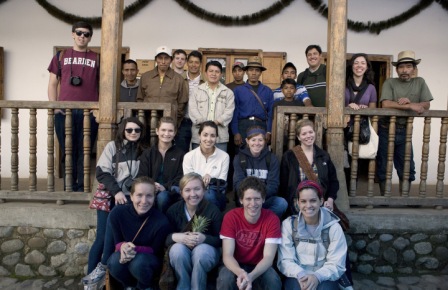My colleague here at Belmont University, Jose Gonzalez, has been working with a group of students to assist honey farmers in Guatemala.
They all spent time in Guatemala over part of the Christmas break and are now back working on plans to help these farmers. Toward that end they have entered their project in Dell’s Social Innovation Competition.
Here is our students’ entry into this competition to set up an entity to support these farmers and to expand a microloan fund:
Our plan is to support the creation of an independent venture that manages the production and commercialization of Fair Trade honey for small-scale farmers in Guatemala.
Background: Located in the mountainous department of Quiche in northern Guatemala, the town of Chajul suffered some of the most brutal violence of Guatemala’s thirty-year Civil War. Its predominantly indigenous community continues to be one of the most economically distressed in Guatemala. Our team traveled to Chajul earlier this year and worked with the coffee farmers of the Asociacion Chajulense. This cooperative of 1,400 Fair Trade and organic coffee producers exports to the US, Canada and Europe, and provides techinical support and social services to its membership.
While the Fair Trade movement has improved the lives of Chajul’s farmers, they continue to struggle with poverty, and recent climate changes have emphasized the urgent need for diversifying their incomes. With this in mind, the Asociacion Chajulense recently launched a venture to Fair Trade Honey production. Honey is an ideal supplemental crop. For most of the year, beehives require only a small amount of maintenance, and the annual division of hives allows for a typical yearly increase in production of 50%. To date, Chajul’s successes with honey are impressive, as 100% of their production has made its way to the European market.
Our plan: To spin off the cooperative’s honey project into a separate entity solely focused on the production and sale of honey. What started as a small initiative to support coffee farmers can become a highly impactful independent economic development initiative for the region. The potential is remarkable. The modest efforts so far have impacted only 50 producers who are involved in honey production activities. We estimate another 1,000 families stand to benefit from the implementation or our plan. Resources would be invested in creating the necessary organizational infrastructure and capacity to manage the newly created social venture. A portion of the funding would be allocated to the expansion of a microloan fund.
Over 85% of the population of Quiche lives on less than $2 a day. The lack of economic development opportunities is a significant detriment to the region. By creating a more efficient opportunity for revenue growth for a cooperative that is a central part of the community, it will greatly improve the livelihood of the honey bee farmers, their families and the community.
Please go to the website and give our students your vote.
Registration is very easy. You can find the Belmont idea here. Just click on “Promote” to give them your vote. Thanks!


Thank you very much for posting this! Through your support we reached the top 10 on popular votes and have recently turned in a business plan and video. There is so much that can be done through the Belmont Entrepreneurship Program, and our group is a testament to that! If you have not already, Dr. Cornwall, you should check out our video (I’ll email it to you). It’s pretty hilarious, If I do say so myself… And I do.
Honey production is generally the main objective of people who venture into the business of beekeeping. Although a lot of insects can also produce honey, the variety produced by honey bees is the honey commonly collected for public consumption. In the same way, not all honey produced by bees are the same. In fact, honey produced from certain nectars like tuliptree, sourwood, and basswood can command a very high price in the market.